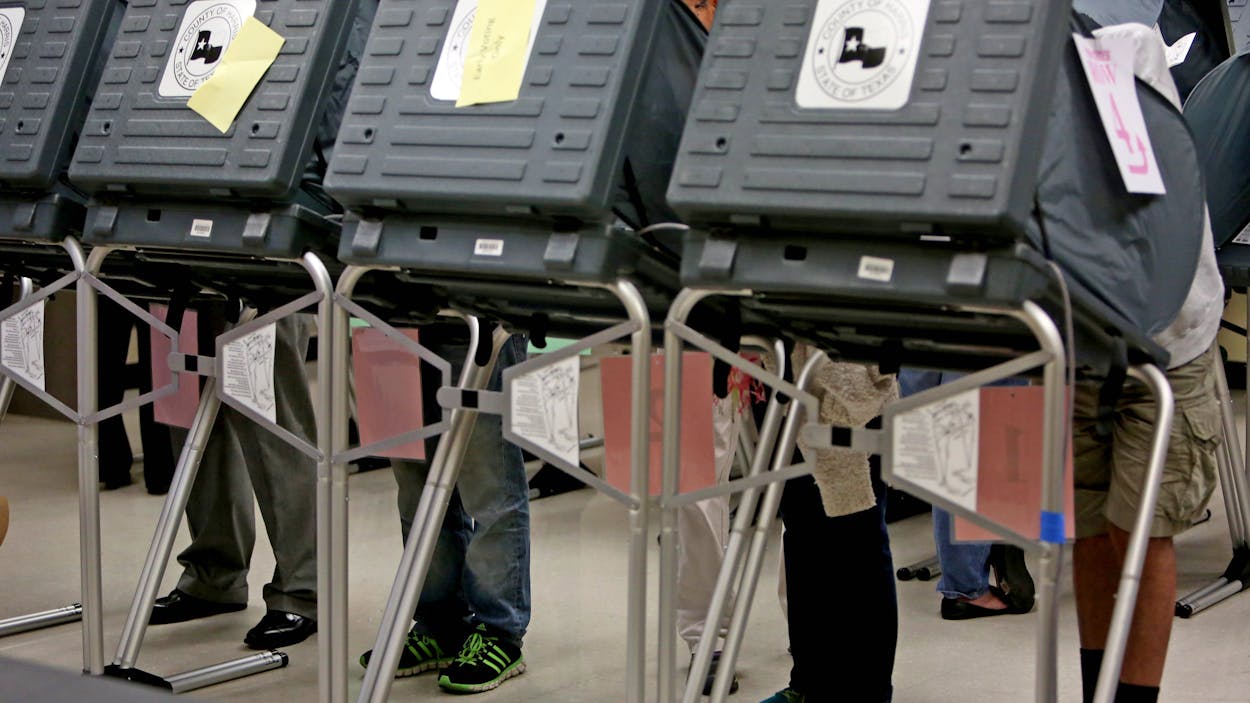With early voting closing Friday and election day looming on Tuesday, supporters of the Houston Equal Rights Ordinance have good reason to be concerned about its survival.
Our own Mimi Swartz wrote extensively on HERO, and why Houston needs it:
The ordinance is designed to protect fifteen classes of people—on the basis of race, ethnicity, age, military service, gender, pregnancy, sexual orientation—from discrimination in housing and employment and the like. Houston is the only big city that doesn’t have one, and the only city in Texas that’s lacking one. It’s designed not only to protect against discrimination but to allow for speedy redress without, literally, building a federal case, which can take forever to resolve.
If you haven’t been following along, HERO’s opponents have focused on only one of the protected classes in attack campaigns: transgender women (described as “troubled men,” by former Astros great Lance Berkman in a radio ad), who they claim will use the ordinance to slip into women’s restrooms in order to prey on vulnerable women and girls.
But despite public attacks from baseball players, HERO’s prospects looked decent at the beginning of the month. According to one poll, 43 percent of Houstonians supported keeping HERO, 37 percent were opposed, and 18 percent undecided, with a margin for error of around 4 percent. That put HERO’s chances of survival at a toss up. With the race that tight, local experts believe that HERO’s survival hinges on above average turnout in Houston’s more socially progressive districts and younger voters.
So far, we’ve seen the opposite.
The early voting turnout has been high: On Thursday, the Houston Chronicle reported that about 133,000 voters had either dropped by a polling station or cast their ballot by mail. That is more people than people who bothered to vote—early or otherwise—in 2011, and at least 20,000 more early voters than any cycle since 2003. As the Chronicle’s Mike Morris pointed out, that could be a bad sign for HERO, as Houston’s progressives always vote in high numbers. It’s a logical conclusion that this year’s boost is coming from voters fixed elsewhere on the political spectrum.
A graph published earlier this week by the Chronicle offers further support for that suspicion. It’s conservative suburbs like Kingwood, Clear Lake and the Memorial area that have seen both the greatest increase in turnout and highest overall totals. What’s more, those voters are overwhelmingly older, and that’s the one demographic most unified in opposition to the ordinance. The youth vote has been virtually nil, a mere one percent of Houstonians 18 to 24 have cast ballots. Meanwhile a whopping 56 percent were 65 and older.
“It’s so hard to believe there are so many people out there who will vote against it,” sighs local progressive activist and blogger Andrea Greer. “I don’t know if I’m hopeful. We’ve run a good campaign, but what can you do when you are up against people who just constantly lie?”
Greer is referring in part to this commercial, Houston’s very own version of the Daisy ad, as crude as a cudgel and just as effective in knocking people senseless.
Greer believes that should HERO fail, it would not be at the hands of fiery religious zealots, but rather more moderate swing voters.
“Otherwise reasonable people I know who claim to be voting against it because they claim the ordinance is drafted poorly,” she says. “It’s not drafted poorly. I believe those people are just looking for an excuse to exercise their fears. And they should think about this: can they look an Iraq war vet in the face and say they opposed giving him or her a local remedy for employment discrimination? Are they ready to find an elderly relative a place to live when an apartment complex discriminates against them? Are they prepared to look the Reverend Bill Lawson, who marched with MLK, in the eye and say ‘Well, if we could have written a better version I could support it. If we’d had a 26th draft after the 37th community meeting, maybe, but sorry, I’m just not concerned enough about racism to vote for this?’”
Over the six years of Parker’s term, Houstonians have broken their arms patting themselves on the back about their openly gay mayor. As the first major American city to elect a gay person, the fact of Parker’s six-year reign was a trump card against the national narrative that Houston was a backward cowtown.
Greer believes that a vote to repeal HERO will utterly undo that nascent progressive image. Instead, Houston would become fixed in the national eye alongside Indianapolis, which become something of a national pariah earlier this year after voters passed a law allowing businesses to discriminate against gay customers. And it’s not just lefties like Greer who fear that stigma: hoping to avoid the tarnished image and economic consequences that came in the wake of the Indy vote, so does much of Houston’s conservative business community.
But it’s about more than public perception for HERO supporters. “This just troubles me deeply,” Greer says. “It’s 2015. Enough. Just like you can’t be a little bit pregnant, you can’t believe in a little bit of equality. You either stand for it or you don’t. I don’t want to guess at what the [early voting] numbers mean because in my heart, I want Houston to be all in on equal rights.”







